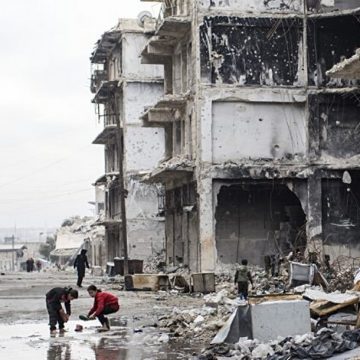

Edited by Giorgio Squadrani and Marco Pasquini
In this Notebook, we propose a reflection, after ten years of war in Syria which has been destroyed, and the future has been taken away from an entire generation. And an invitation to continue to call for peace and adequate humanitarian support for the suffering population.
Over half a million dead and 12 million displaced. Towns and villages turned into permanent piles of rubble. Schools were bombed (with children inside), and the same fate was for hospitals (with sick people inside) and open-air markets. A devastated country has scarred far beyond the limit of tolerable. The UN estimates that 90% of the population lives in conditions of extreme poverty. The economy is in free fall inflation is out of control. There is a shortage of both food and fuel for heating. While, the Covid19 pandemic is spreading far beyond the official numbers, with a health system in which there is no more adequate machinery and a lack of doctors and nurses. The remaining beds are perpetually occupied. Surreal to imagine the existence of adequate equipment of masks or tampons: oxygen is lacking, in many areas, and even drinking water is lacking too. A situation that defines drama is little. And the end of the tunnel is still not in sight. And in this context, the United Nations stubbornly pursues the strategy of regional and international reconciliation. The European Union and the United Kingdom returned to the unrealistic positions of ten years ago by calling for a change of government and continuing to forget the demographic priority of the region of Damascus where humanitarian aid was denied to a population that considered itself politically opposed.
According to the estimates contained in the Humanitarian Response Plan 2020, drawn up by the international community operating in Syria and coordinated by UN agencies, to date, there are about 8 million people in conditions of “food insecurity” in Syria and almost 11.5 million people in need of various types of care (health, education, or access to other essential services). Syria is a nation devastated by a decade-long conflict that has caused over 500 thousand deaths and millions of displaced persons. The level of criticism, experts warn, is now “alarming”. From the results of a study carried out at the end of 2020 by the WFP (World Food Programme), it emerges that about 60% of the population is “in a food insecurity situation, and this is by far “the worst data ever recorded” since the beginning of the conflict. In an inhabited nation, by about 20 million people, 83% of the population, according to United Nations estimates, lives below the poverty line. Ten years of civil war, jihadist violence, the refugee emergency, international sanctions, and galloping inflation, even in neighboring Lebanon, have brought the country to its knees, and the most affected, as pointed out by the Maronite Archbishop of Damascus, are the most fragile, the sick, children and the elderly in the context of a crisis never seen before: “The last few months have been very hard for the Syrians, because the national lira has fallen a lot. Before the new coronavirus, the ratio was one to 1500, now we are at 3600 lire for a dollar. An average salary is 25/30 dollars, while commodity prices have greatly increased due to inflation. The government gives out bonuses a couple of times a year, but it is of little use. A family, in many cases, is forced to survive with a dollar a day or even less. The Syrian people are in terrible conditions, hopeless for the future, without a light at the bottom of the tunnel. We need cooperation at all levels. We need to loosen sanctions and guarantee the possibility of traveling, investing in the reconstruction and construction of the rule of law and democracy”.